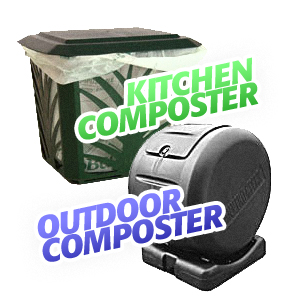Composting is the earth's way of recycling – a process in which organic material is broken down into a soil-like state called humus. Although a natural process, the act of composting creates ideal conditions for decomposition and speeds the breakdown along. Not only does composting help reduce landfill quantity (as much as 50% of what is thrown away is thought to be organic), but it creates a wonderful additive for soil that can improve its well being and its fertility.
Want to find out how to get your own compost started or learn about any compost programs in your neighborhood? Visit the links below.
Compost Models

Bags used for organic waste

Garden Debris
The garden debris collection (leaves, scraps from pruned hedges, grass and garden residues) usually takes place in Montreal on Wednesdays, in October and November, and again during the spring months. Collected garden debris will be used as compost for the city's horticultural needs and will also be distributed to residents on request. The use of see-through bags is mandatory. Bags must be deposited between 9 p.m. the night before and 7 a.m. the day of pick-up.
Compostable Items
Food
- Fruits
- Vegetables
- Cereals
- Egg shells
- Corn stalks
- Corn cobs
- Tea bags
- Coffee grounds
- Cocoa bean shells
Animal
- Gerbil, hamster, and rabbit bedding
- Chicken, cow, and sheep manure
Material
- Cardboard and cardboard tubes
- Egg cartons
- Paper towels and bags
Vegetation
- Weeds
- Flowers
- Grass
- Leaves
- Hay
- Peat moss
- Pine needles
- Garden waste
- Old straw and hay
- Hedge clippings
- Wood ash and shavings
- Sawdust
Non-Compostable Items
- Meat
- Fish
- Cooked food
- Items fouled with pigeon droppings
- Glossy magazines
- Cat litter
- Dog feces
- Disposable diapers
- Coal ash
* Sources: Gorilla Composting & Composting Council of Canada

